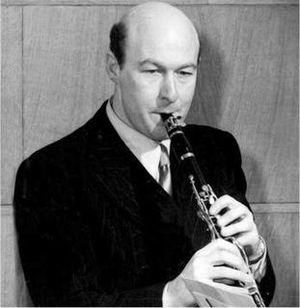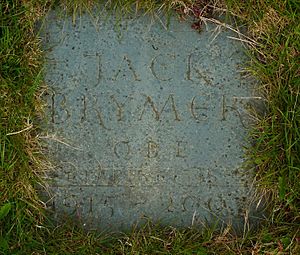Jack Brymer facts for kids
John Alexander Brymer (born January 27, 1915 – died September 15, 2003) was a famous English clarinet player. Many people, including The Times newspaper, called him the best clarinettist of his time. He mostly taught himself how to play. He played music as a hobby before a famous conductor, Sir Thomas Beecham, asked him to join the Royal Philharmonic Orchestra in 1947. He played with them until 1963.
Brymer also played in other big orchestras like the BBC Symphony and London Symphony Orchestras. He loved playing jazz music throughout his life. He also taught music at several important schools for many years. Brymer often appeared on radio, both playing and hosting shows. He made many recordings and wrote books about music and his life.
Contents
Jack Brymer: A Clarinet Star
Growing Up and Learning Music
John Alexander Brymer was born in South Shields, England. His dad also played the clarinet, and young John started trying to play when he was only four years old. He never had formal lessons for the clarinet. Instead, he learned music and figured out how to play the instrument by himself.
He played in local bands and amateur orchestras with older people. This helped him learn a lot in a very practical way. Even as a boy, he enjoyed many types of music. This included jazz, light music, brass-band music, and even circus music. He later said that all these different styles helped him a lot in his professional career.
Brymer went to Westoe Secondary School. He was very good at rugby football. He wanted to have a career in music. However, when movies started having sound, many musicians lost their jobs. This made him think about other careers.
From 1933, Brymer trained to be a teacher at Goldsmiths College, London University. He then became a teacher at Heath Clark School in Croydon. In his free time, he played in amateur music groups. He met Joan Richardson, a string player, at college. They got married in 1939 and had one son.
Even though he didn't have formal lessons, Brymer believed he learned from everyone he heard play. He studied how other famous clarinettists like Frederick Thurston and Reginald Kell played. He also learned from Charles Draper and Haydn Draper. Brymer said they taught him a lot without even knowing it.
During World War II, Brymer served in the Royal Air Force. He was a physical training instructor. When he wasn't on duty, he often played in a dance band. There, he met Dennis Brain, a horn player, who liked Brymer's playing. Dennis Brain later helped Brymer's career a lot.
Playing with Top Orchestras
The Royal Philharmonic Years
In 1946, Sir Thomas Beecham started the Royal Philharmonic Orchestra. Famous musicians like Reginald Kell and Dennis Brain played in it. In 1947, Kell decided to leave. Dennis Brain suggested Brymer as a good replacement to Beecham.
Brymer was teaching again after the war. He was surprised to get a call from Beecham asking him to audition. At first, he thought it was a joke! But when he realized it was really Beecham, he agreed to audition. After hearing him play, Beecham hired him. Brymer's first performance with the orchestra was in an opera called "The Trojans."
The Times newspaper said that after joining the Royal Philharmonic in 1947, Brymer was Britain's top clarinettist. His smooth playing style and calm stage presence impressed many people. In the orchestra, Brymer joined other amazing wind players. They were known as "the Royal Family" by their colleagues and audiences. With Beecham and the Royal Philharmonic, Brymer made his first recording of Mozart's Clarinet Concerto in 1958.
Moving to Other Great Orchestras
After Beecham passed away in 1961, Brymer and other musicians were not happy with how the Royal Philharmonic Orchestra was managed. The head of music at the BBC, William Glock, invited Brymer to join the BBC Symphony Orchestra. Brymer was a main clarinettist there from 1963 to 1971. He also started playing more chamber music, which is music for small groups of instruments.
In 1971, Pierre Boulez became the chief conductor of the BBC Symphony Orchestra. He wanted a more modern and sharp sound from the musicians, which Brymer did not like. So, Brymer joined the London Symphony Orchestra as a main clarinettist. You can hear Brymer's sound from his time with the London Symphony Orchestra in a 1972 recording of Rachmaninoff's Symphony No 2. A music critic called his playing "breathtakingly expressive."
Brymer was part of several chamber music groups. He was a founder of the Wigmore Ensemble, the Prometheus Ensemble, and the London Baroque Ensemble. He also led the London Wind Soloists. Throughout his career, Brymer loved playing jazz music. He played with many top British and American jazz musicians. When the Royal Philharmonic was on tour in New Orleans, Brymer even played with local jazz stars.
Teaching and Sharing His Music
Brymer was also a dedicated teacher. He was a professor at the Royal Academy of Music from 1950 to 1958. He also taught at the Royal Military School of Music and the Guildhall School of Music. Many works were written especially for him, including pieces by Cecil Armstrong Gibbs and Guy Woolfenden.
Brymer was well-known for his radio shows. He had an easy way of speaking on the microphone, and his programs for the BBC were very popular.
Later Life and Legacy
The London Symphony Orchestra honored Brymer with special concerts for his 70th and 75th birthdays. By his 75th birthday, he had retired from playing in orchestras full-time. However, he continued to perform. He played at a concert for his 80th birthday with the English Chamber Orchestra. At this concert, he played Mozart's Clarinet Concerto and Clarinet Quintet, and Weber's Clarinet Concerto No 1.
Brymer's last public concert was on July 18, 1997, in London. He performed Mozart's Clarinet Quintet. Before the show, Brymer told the audience that this piece was very special to him. He felt it was the right music for his farewell to the concert stage.
Brymer passed away in Redhill, Surrey at the age of 88. His ashes were buried near the grave of Sir Thomas Beecham in the churchyard of St Peter's, Limpsfield.



